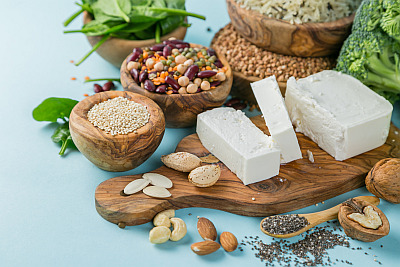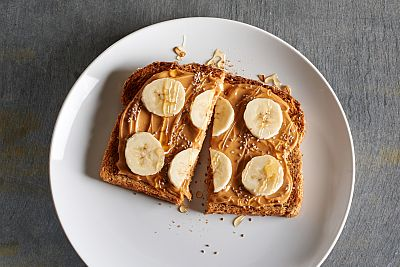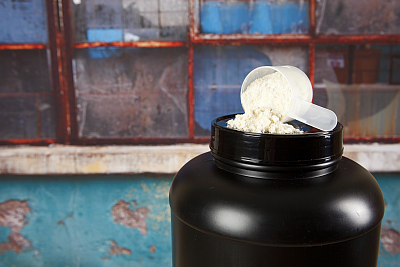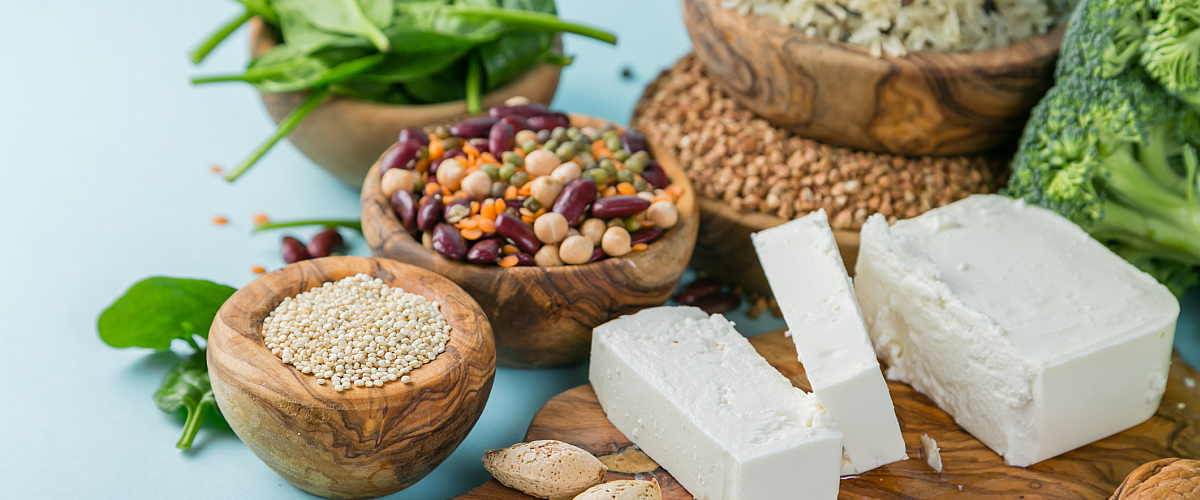First was fat, then came carbs and now protein is having its moment in the spotlight—and on the shelves. Whether the goal is to fill up or bulk up, it seems everyone from your cube-mate to your gym buddy can’t get enough.
Protein is an important macronutrient. Just like carbohydrates and fat, it’s mission-critical to our health. (Fun fact: Protein is actually the most plentiful substance in the body after water.)
But should you go all-in with protein? And what exactly does protein do, anyway? Enter Aramark Registered Dietitian Nutritionist (RDN) Julia Werth who is here with those answers and more.
Why does my body need protein?

Our bodies need protein to rebuild and repair muscle tissue. Protein also helps with important body processes like your immune response. It gets extra credit for making our hair, nails and skin strong and durable, too. “In fact, thinning hair and cracking nails can be a sign someone’s not getting enough protein,” Julia shares.
Will protein help me build muscle?
Each time you exercise, your muscles break down just to be built back stronger. Protein helps with this natural process. “Eating protein does not automatically build muscle, but, if you combine it with a good workout regimen, you’ll increase your muscle mass,” explains Julia. The best time to eat protein is up to 90 minutes after exercising, she adds, as that is when your muscles are primed to use it.
Can protein help me lose weight?
Despite what you may have read on a magazine cover or your social feed, no one food group can help you lose weight. Instead, think big picture. “Weight is determined by everything in your diet, along with exercise, sleep and genetics,” Julia says. But here’s is a silver lining: Protein can help keep your blood sugar steady and keep you feeling full, so you don’t get so hungry between meals. And that may help you reach your weight loss goal.
How much protein should I eat? How much is too much?

As with most things in the nutrition world, the answer varies from person to person. “How much protein you need depends on your age, gender, weight and lifestyle,” Julia shares. “A good starting point is to eat 7 grams of protein for every 20 pounds of body weight. If you weigh 150 pounds, shoot for about 53 grams of protein daily.”
A professional athlete trying to build muscle will need more protein than someone who spends most of their day sitting down. Even the type of exercise matters. “That same 150-pound person will need to eat 82 to 95 grams of protein if she is an endurance athlete, like a long-distance runner,” elaborates Julia. “And if she’s big into strength training, her daily target may reach as high as 122 grams.”
Most of us already eat plenty of protein, Julia points out, so don’t go overboard. Any protein your body doesn’t need will be stored as fat. Too much can also lead to dehydration and weaken your bones over time—and that’s no good.
Are all proteins created equal?
When you hear “protein,” do you think of steaks and chicken breasts? Many people do, but protein can actually come from both animal and plant sources—and plant sources are just as good, says Julia.
Animal proteins (think eggs, dairy, fish and meat) are called complete proteins, meaning they provide all the essential amino acids our bodies can’t make on their own. Only some plant-based proteins are considered complete (like quinoa and buckwheat).

“As long as you’re eating a balanced diet with foods like seeds, nuts, legumes, whole grains, fruits and vegetables daily, this isn’t something you have to worry about,” says Julia. “You’re getting everything you need and more.”
“With less saturated fat, plant-based proteins can be a better pick for someone at high risk of cardiovascular disease,” she adds.
What’s the best source of protein?
Great protein options include fish, chicken, eggs, low-fat dairy, nuts, seeds, black beans and legumes. “You can easily meet your protein needs by choosing a balanced diet with a variety of healthy plant and animal foods,” Julia advises.
Here’s how some popular protein sources stack up:
- 3 ounces of lean meat (like chicken) = 24-27 grams
- 4 ounces of fish or shellfish = 18-22 grams
- 6 ounces of plain, nonfat Greek yogurt = 17 grams
- 1 cup of beans or lentils = 15 grams
- 1 egg = 6 grams
- 1 ounce (small handful) whole unroasted almonds = 6 grams
What about protein shakes?

They’re rarely necessary. Julia encourages a food first approach: “For the average person, it’s best to get dietary protein from food.” You may find it easier to spread your protein out throughout the day. Breakfast is often the most lacking, Julia notes; scrambled eggs or peanut butter toast will do the trick.
And what about protein bars and powders?
Repeat after Julia: “Food first always!” Protein powders and bars probably won’t hurt you, but they aren’t much help, either. However, if your access to food is limited during an athletic event or if your training regimen is unusually intense, powders and bars can be a useful tool. When available, always look to include a high-density protein food like chicken, fish, yogurt or soy with every meal.
Get with the (protein) program.
Feeling more protein prepared? Now brush up on your knowledge of carbohydrates and fats to discover what they do for your health—and complete the macronutrient trifecta!
Note: Since everyone’s health history and nutritional needs are so different, please make sure that you talk with your doctor and a registered dietitian to get advice about the diet and exercise plan that‘s right for you.

